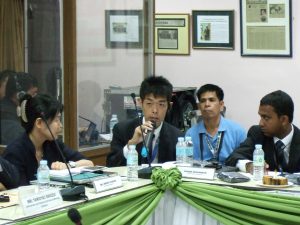Yusuke Hasumi
Assistant Manager, Corporate Planning Dept.
Zenkyoren, JAPAN

As a delegate to the AOA Members’ Study Group Visit to Philippines, which AOA held on August 2 & 3, 2016, I visited CARD MBA and the CARD group. The visit gave me a valuable opportunity to get a feel for the situation of low-income households in Philippines, where about 25% of the population is said to belong to low-income group. It also gave me an opportunity to see the management and operational structures, such as branch management and communications in the field, of the microinsurance and microcredit organizations striving to remedy this social issue.
I would like to describe a center meeting I attended, which was particularly impressive for me, as follows:
While collection of payments and weekly contributions was very important for the operation of microinsurance and microcredit, what I focused on personally in the center meeting were such things like “the pledge not to get involved in improprieties”, “the confirmation of the previous meeting’s minutes”, and “the learning of microinsurance”. I would summarize the role of each of these as below:
(i) As for “the pledge not to get involved in improprieties”, the staff of the CARD group and center members read the pledge aloud together. This constantly reminds every attendee of a sense of compliance.
(ii) “The confirmation of the previous meeting’s minutes” plays an important role in ensuring that all present, including those who were absent from the previous meeting, are aware of matters such as decisions already made and rules.
(iii) “The learning of microinsurance” means that center members hear the real experiences of other members who were able to cover their medical costs and costs of living with insurance after suffering from traffic accidents or other incidents. This not only serves in an educational role to ensure better understanding of the need for insurance but also increases the incentive to get insurance.
I was deeply impressed with the well-knit scheme of the CARD group’s business model, although I was not sure how consciously the CARD group had structured the operation of its center meetings. The visiting team split into three groups and each team visited a different center meeting. After having talked about the impression of center meetings with other delegates who joined the different groups from me, it was interesting to know that there existed various types of center meeting venues and surrounding areas in terms of household income or economic situation even in the same area.
Another impressive thing for me in Philippines was the fact that microcredit organizations not only made unsecured lending to their members but also supported the members in terms of educational and managerial matters after lending. In Japan, also, the administrator appeares to have changed with regard to the roles of regional finance. For example, the Department of Finance requests regional banks, which have simply provided loans on the assumption that they can recover the loan value with the collateral in order to maintain their own soundness, to strengthen the ties with local businesses through steady efforts by supporting them especially in managerial areas, namely “relationship banking”.
In feudal Japan, there was a system called a “rotating savings and credit association” (Tanomoshiko or Mujin in Japanese) that was a group of individuals who agreed to meet on regular basis in order to save and borrow together. It was like a combination of peer-to-peer banking and peer-to-peer lending. It seems to me that the philosophy of this old system is similar to that of cooperatives and mutual associations in the modern age, regarding the concept of mutual aid. In addition, I think that the CARD group’s business model is more or less in common with such system in Japan, chiefly in the area of fundamental ideas.
I think Japan’s JA Group can learn a lot from the CARD group. Furthermore, I believe that the experience in Philippines should provide a good opportunity for all of the delegates to recognize the importance of their own activities that are essential to people in the community.
Finally, I would like to express my sincere appreciation to CARD MBA and the CARD group for accepting us.
Thank you very much.




